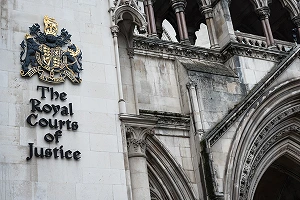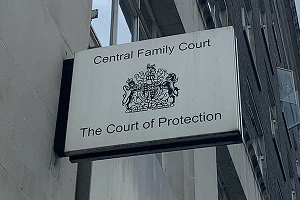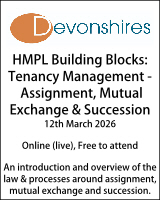
Birmingham settles historic equal pay claims
Birmingham City Council, UNISON and GMB have agreed to settle the outstanding equal pay claims brought by the two unions on behalf of members working for the local authority and Birmingham Children's Trust.
October 14, 2025
Birmingham settles historic equal pay claims
Birmingham settles historic equal pay claims
Oct 14, 2025
LLG unveils new chair of LLG Board
Oct 10, 2025
TfL appoints 19 firms to £120m legal services panel
Oct 09, 2025
Features

Litigation as stewardship: How UK pension funds including LGPS are shaping corporate accountability
October 10, 2025
Jamie E. Hanley looks at recent cases where LGPS funds have engaged in securities litigation and sets out some key considerations.

Revisiting Cheshire West
October 10, 2025
Later this month the Supreme Court will examine issues raised in its landmark Cheshire West ruling on deprivations of liberty. Lucy Series sets out what is at stake.

Wardship and Inherent Jurisdiction: Decisions involving competent 17-year-olds
October 10, 2025
Graeme Bentley considers a recent High Court decision in which wardship and the court’s inherent jurisdiction were used to determine the residence of a competent 17-year-old, highlighting the interaction between a child’s wishes and parental Article 8 rights.

Public children law case update – Autumn 2025
Oct 10, 2025
How not to control second homes
Oct 09, 2025
Twelve New Towns for the Future
Oct 09, 2025
Artificial intelligence in Education and EHC Plans
Oct 03, 2025
High Court on highway widths
Oct 03, 2025
Risk assessment – a safeguard to fairness
Oct 03, 2025
Parental obstruction of care
Oct 03, 2025
School exclusions – CCTV and police investigations?
Oct 03, 2025
Transparency in the Court of Protection
Oct 03, 2025
Tackling youth ASB in social housing
Oct 02, 2025
SPONSORED

Unlocking legal talent
Jonathan Bourne of Damar Training sets out why in-house council teams and law firms should embrace apprenticeships.

How hair strand testing should be instructed for family court proceedings
For years, FTS, a drug, alcohol and DNA lab in Yorkshire, has been advocating for an end to the use of Society of Hair Testing (SoHT) cut-off levels in the family courts, writes Paul Hackett (Sponsored Editorial)
Webinars
The Planning and Infrastructure Bill – what’s in, what’s out and will it work?
Join Landmark’s barristers for an initial review of the Planning and Infrastructure Bill and what it might mean for planning in practice.
More Features

How AI could rewrite homelessness law
October 02, 2025
Amandeep Bains sets out the key considerations if AI is to be used in homelessness decision-making.

Social and affordable housing as a driver of economic growth
September 30, 2025
The Labour government has committed to delivering “the biggest increase in social and affordable housebuilding in a generation”. Joanna Lee-Mills and Alexander Rose explain why this is regarded not only to be a moral obligation but also an opportunity to drive economic growth.

Suitability of accommodation offered in performance of the prevention duty
September 30, 2025
The Court of Appeal recently had to consider for the first time the nature and impact of the s. 189A Housing Act duties on the lawful performance of the s.195 prevention duty in section 204 appeal proceedings. Genevieve Screeche-Powell analyses the ruling.

Key updates to the Administrative Court Guide
Sep 30, 2025

PFI expiry and handback
Sep 26, 2025

Payment requirements under the Procurement Act 2023
Sep 26, 2025
Civil protective orders and gangs
Sep 26, 2025
School admissions: A guide to parental rights
Sep 24, 2025
A hard road
Sep 19, 2025
Gypsy/Traveller caravan sites and supply of pitches
Sep 18, 2025
Below-threshold contracts
Sep 18, 2025
A different kind of target
Sep 18, 2025
DOLS and the Young Offender: Care or Custody?
Sep 17, 2025
Brief enquiry of age
Sep 17, 2025
School trips: key legal considerations
Sep 17, 2025
-
Council wins Court of Appeal battle over succession to property after mother entered care home
-
Council wins Court of Appeal battle over whether appellant became "homeless intentionally"
-
Council wins High Court battle over viability and amount of affordable housing
-
Council wins possession of wildlife garden but eviction must wait for JR hearing
-
Council wins rare appeal to Upper Tribunal over Right to Buy exemption
-
Council wins row over providing ‘maximum reasonable amount of affordable housing’
-
Council wins Supreme Court appeal in landmark Japanese knotweed case
-
Council wins Upper Tribunal appeal over ‘reasonable excuse’ for failure to license house in multiple occupation
-
Council wins Upper Tribunal appeal over cancellation of selective licensing penalties for "reasonable excuse"
-
Council wins Upper Tribunal appeal over whether property was house in multiple occupation
-
Council wins Upper Tribunal battle over service charge and replacement central heating
-
Council wins Upper Tribunal battle with property company over membership of redress scheme
-
Councillor found guilty on two counts of fraud by misrepresentation over housing tenancy
-
Councillor from neighbouring authority fails in bid to obtain legal advice on planning application after Tribunal upholds privilege
-
Councillor wins £30k damages after BBC misidentified her as politician accused of housing fraud
-
Councils “all too often” failing in duties to prevent homelessness, says Ombudsman
-
Councils “letting down tenants” who complain of category one hazards in privately rented homes: BBC report
-
Councils “threatening to take children of undocumented parents into care”: claim
-
Councils adopt mitigation measures to overcome problems with nitrate pollution and development
-
Councils and central government failing to secure safe housing in private rented sector, spending watchdog finds
Page 31 of 161
Contracts & Procurement Lawyer
£44,075 - £51,356 per year with market supplement of £7,703 reviewable annually
Trust Solicitor (Public & Healthcare Law)
£55,690 - £62,682 per annum
Senior Lawyer - Contracts & Commercial
£50,620 - £57,611 per annum
Trust Solicitor (Employment & Contract Law)
£Please enquire
Lawyer - Property
£41,771 - £47,181 per annum
Locums
 Institutional landlord series: Possession – High Court Enforcement - 5 Pump Court
Institutional landlord series: Possession – High Court Enforcement - 5 Pump Court
22-10-2025 4:00 pm
Online (live)
 Institutional landlord series: Costs Recovery and Legally Aided Parties - 5 Pump Court
Institutional landlord series: Costs Recovery and Legally Aided Parties - 5 Pump Court
05-11-2025 4:00 pm
Online (live)
 HMPL Building Blocks: Tenancy Management – Assignment, Mutual Exchange and Succession - Devonshires
HMPL Building Blocks: Tenancy Management – Assignment, Mutual Exchange and Succession - Devonshires
12-03-2026
Online (live)
 Unpicking the Procurement Act Episode 2: Exclusion and Debarment - 39 Essex Chambers
Unpicking the Procurement Act Episode 2: Exclusion and Debarment - 39 Essex Chambers
On Demand
Online (pre-recorded)
 Unpicking the Procurement Act Episode 1: Overview and New Procedures - 39 Essex Chambers
Unpicking the Procurement Act Episode 1: Overview and New Procedures - 39 Essex Chambers
On Demand
Online (pre-recorded)
 Unpicking the Procurement Act Episode 3: Contract Modification - 39 Essex Chambers
Unpicking the Procurement Act Episode 3: Contract Modification - 39 Essex Chambers
On Demand
Online (pre-recorded)
 Unpicking the Procurement Act Episode 4: Challenges and Remedies - 39 Essex Chambers
Unpicking the Procurement Act Episode 4: Challenges and Remedies - 39 Essex Chambers
On Demand
Online (pre-recorded)























![Break Stuff – The decision in On Tower UK Ltd v British Telecommunications plc [2025] and the impact in respect of break rights in Code Agreements](/images/thumbnails/raxo/tb-w300-h200-cut-int-2825fbef2250bcf14cac590a4433cecf.webp)


























































































 CUBAS Comprehensive Training & Licencing (Swindon), October 2025
CUBAS Comprehensive Training & Licencing (Swindon), October 2025  Property Law Roadshow 2025 - Cardiff - St John's Chambers
Property Law Roadshow 2025 - Cardiff - St John's Chambers  Planning Day 2025 - Cornerstone Barristers
Planning Day 2025 - Cornerstone Barristers  Annual Fraud Conference 2025 - Oxford Investigation Service
Annual Fraud Conference 2025 - Oxford Investigation Service  Ivy Legal - Certificate in Planning Enforcement
Ivy Legal - Certificate in Planning Enforcement